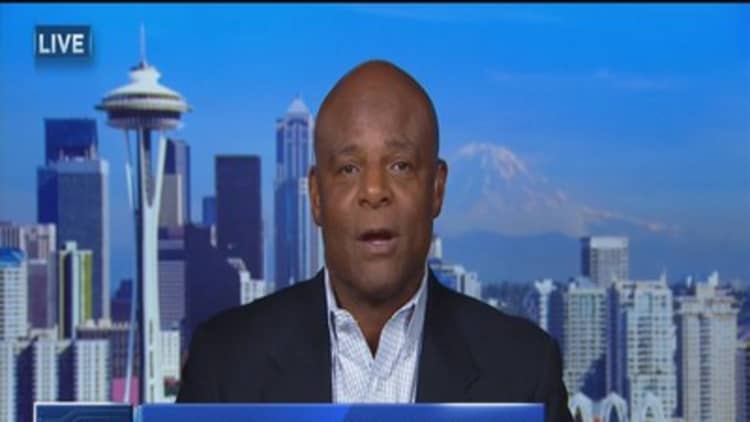Dustin Fink gets worked up when he talks about football. An "unabashed" Denver Broncos fan, he clears his schedule to watch games, and he loves the memories of a lifelong passion that each play evokes.
But many games bring up another emotion, too, for Fink: He feels like a hypocrite.
An athletic trainer at a high school in central Illinois, Fink manages The Concussion Blog, which tracks and discusses issues of head trauma in sports and beyond. As he learns more and more about the potential long-term health problems associated with head collisions, it becomes increasingly difficult for him to watch football games, Fink said. But he can't quite tear himself away.
"Football is a beautiful, violent sport that I will not stop watching until somebody probably dies on the field," Fink said. "I question my profession and my professional ability: That's what the sport does to you, it's crazy — it's like crack cocaine, right?"
Fink's experience may ring true for some Americans. A spate of recent revelations about former football players suffering from chronic traumatic encephalopathy (CTE) — including former Raiders quarterback Ken Stabler, and ex-Giant Tyler Sash — have done little to dim the immediate prospects of the National Football League.
More than 100 million people are expected to tune into the Super Bowl on Sunday, and playoff ratings continue to rise sharply, so experts say it's fair to conclude that player safety concerns are not harming the NFL's short-term business.
"This is the pre-eminent sports brand in this country, to the degree that it really blows everything else out of the water, and it does seem to be iron plated," said Michael Lewis, a professor of marketing at Emory University. "My gut response is the NFL is fine, the NFL is resilient."
Rick Burton, David B. Falk professor of sport management at Syracuse University, said he agrees that the concussion question doesn't represent an existential problem for the NFL.
"Is the NFL feeling the pressure? Yes. Do I think the game is going to go away and we're in danger of no more football? No," he said.
But media outlets keep calling CTE football's "bogeyman," and there are new pronouncements every day that the league may not exist in a few decades.
An op-ed published in The New York Times on Thursday suggested that if the NFL "can't effectively deal with the concussion issue, it may follow the same arc as boxing" — which is to say it may become "a marginal activity in this country."
In a Pittsburgh Post-Gazette story about his post-football struggles with memory and walking, former Steeler Antwaan Randle El is quoted as saying that he "wouldn't be surprised if football isn't around in 20, 25 years" because of the sport's inherent violence.
In fact, Randel El said in that article that, if he could do it all over again, he never would have played football.
And that's the way the issues of head trauma and CTE could come back to harm the NFL. Experts told CNBC that participation could slide on the youth level, and that would trickle up to the pros.

Parental litigation and insurance issues tied to head injuries could lead to the end of public funding for high school football, Fink said, adding that the sport's recruitment pool would begin to stagnate if pre-college play was forced to rely on private funding.
And funding may be the major concern, as health risks are unlikely to dissuade potential players from joining the sport.
"At the end of the day, this is what young adult males are willing to do," Lewis said, highlighting the enduring appeal of boxing, mixed martial arts, and other potentially dangerous sports.
Many experts say the NFL can sufficiently tweak its rules to protect the players, but opinions are mixed on whether the league is currently doing enough.
Fink objected to the way the NFL is picking and choosing which studies to fund, and he contended that rule changes regulating tackles wouldn't make the game less exciting.
But the league isn't currently ignoring the issue: The NFL directed CNBC to its $40 million initiative to fund brain research health technologies development, and its $20 million for "innovative solutions" to the problem.
The league also provided a $45 million grant to help with safety education at the youth and high school levels. And it has instituted new rules to address the issue.
Still, reported concussions in the NFL rose 58 percent in 2015 (although the rise may be attributable to more screenings). The league said it will review its concussion protocol in the offseason.
The current concern about concussions may be "the front end of a massive societal push to really understanding safety in sport," Burton said, adding that the league appears to be "handling it as best they can."
Still, public perception can turn on a dime, and the NFL is hardly out of the woods from a branding perspective, experts said.
"The fear is that the brand starts to feel under fire — if it's not just about excitement and competition (any more)," Lewis said. "That can tarnish the brand in the long term."
But concerns about safety are unlikely to drive away the various industries profiting off of football anytime soon: Everything from media, to marketing, to consumer goods, will gain from NFL and Super Bowl branding.
"It will drive the American economy in a bunch of different ways," Burton said. "And, capitalists that we are, I don't think we're going to give up that cash cow."
Disclosure: CNBC's sister company, NBC, has a contract with the NFL to televise games on Sunday nights.




